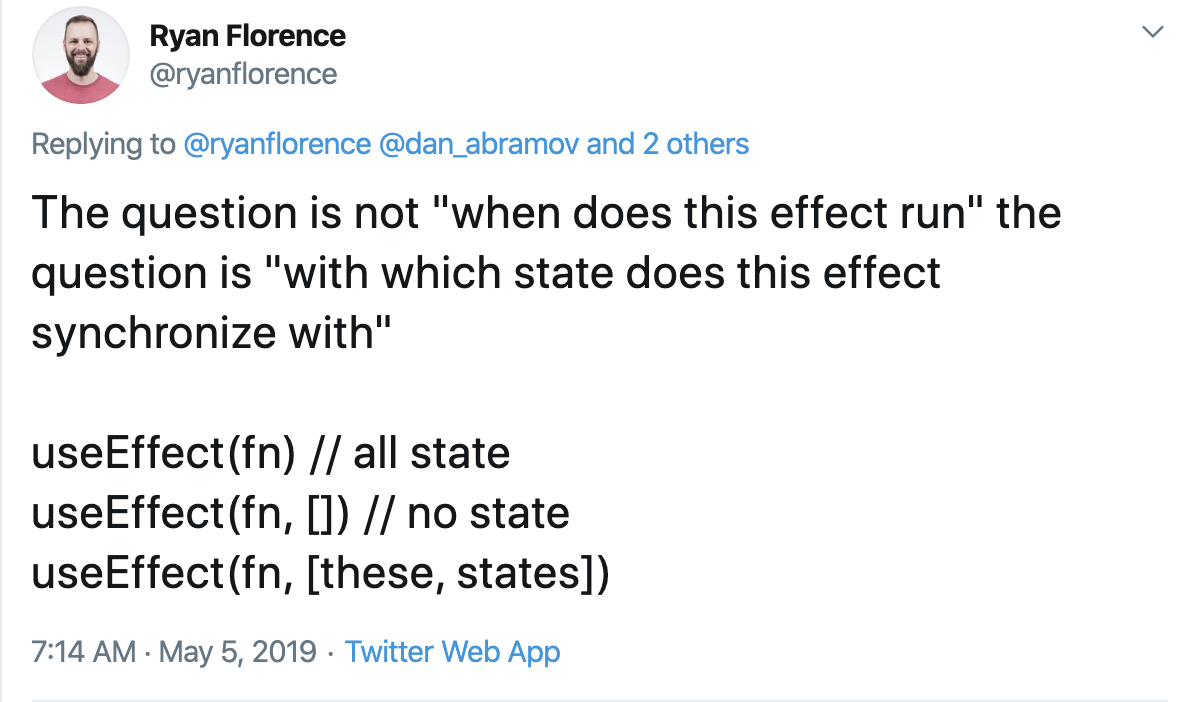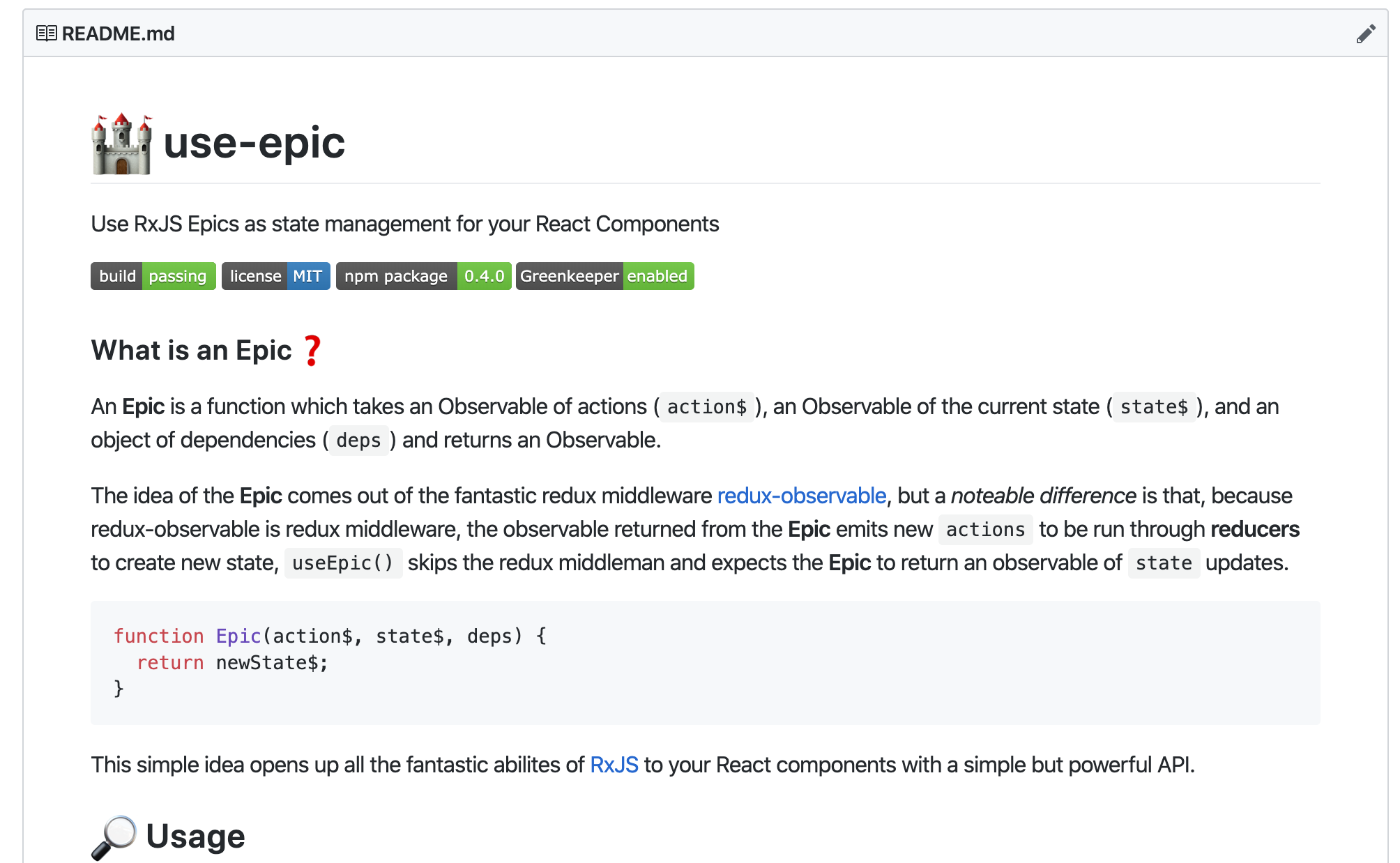
+
RxJS with React
The best, most maintainable code, is code that matches the way you think about the problem, without a lot of noise
What do I mean by noise...?
Therefore, the best
Language / Framework / Library
FOR YOU
is the one that either:
A. Matches your way of thinking
B. Guides you to think in a different way

+
Succinct, expressive code, that lets you build complex web applications
"without a lot of noise"
Why RxJS?



Succinct, expressive code for dealing with
events, asynchronicity and state

Steep Learning
Curve


Declarative Style
Functional in Nature
Encourages Immutability

Why React?
Succinct, expressive code for dealing with
UI based on discrete synchronous state updates
Steep Learning
Curve

Declarative Style
Functional in Nature
Encourages Immutability
Why RxJS with React?

+
Sync State



Change the way you think about problems

+
How to use RxJS with React
observables with
useState()
useEffect()
+
const [state, setState] = useState()
useEffect(() => {
const sub = observable$.subscribe(
newState => setState( newState )
);
return () => sub.unsubscribe()
}, [])Syncing State
const [people, setPeople] = useState();
useEffect(() => {
const sub = ajax(ENDPOINT).subscribe(
({ response: { results } }) => {
setPeople(results);
}
);
return () => sub.unsubscribe();
}, []);RxJS.ajax()
const people = useSelector(
state => state.people
)
const dispatch = useDispatch()
useEffect(() => {
dispatch({ type: FETCH_PEOPLE })
}, [])Redux fetch

const [people, setPeople] = useState();
useEffect(() => {
cosnt url = ENDPOINT + `?filter=${filtertext}`
const sub = ajax(url).subscribe(
({ response: { results } }) => {
setPeople(results);
}
);
return () => sub.unsubscribe();
}, [ filtertext ]);Prop Changes
const [events, setEvents] = useState();
useEffect(() => {
const sub = calendar$.pipe(
map(calendar => calendar.events),
distinctUntilChanged()
).subscribe(setEvents);
return () => sub.unsubscribe();
}, []);Perf
Separation of Concerns
// The same in every component
const [state, setState] = useState()
useEffect(() => {
const sub = state$.subscribe(
newState => setState( newState )
);
return () => sub.unsubscribe()
}, [])Actions
const useObservable = fn => {
const [state, setState] = useState()
const state$ = useRef(new BehaviorSubject()).current
const actions$ = useRef(new Subject()).current
const newState$ = useRef(fn(actions$, state$)).current
const dispatch = action => actions$.next(action)
useEffect(() => {
const subscription = newState$
.subscribe(newState => setState(newState))
return () => subscription.unsubscribe()
}, [newState$])
return [state, dispatch]
}useObservable
const MyComponent() {
const [count, dispatch] = useObservable(
(actions$, state$) => {
actions$.pipe(
combineWithLatest(state$),
switchMap(([,n]) =>
ajax(endpoint(n + 1)).pipe(
map(response => respose.result)
)
)
)
}
);
return (
<button onClick={e => dispatch(e.target.value)}>
{count}
</button>
);
}useObservable
const Container = (props) => {
const [state, dispatch] = useObservable(myEpic);
const handleChange(e => dispatch({
type: 'CHANGE',
payload: e.target.value
}));
return (
<Presentational {...state}
onChange={handleChange}
/>
);
}A new container

+

Benefits?

+
Succinct, expressive code
Powerful best in class abstractions
Separation of Concerns
Components become about
User Interface
Separation of Concerns
Observables are how you handle application state and events
Testing
Test components and observables separately
Cross Framework
Use tools and from other communities
Awesome
Rx Tools
RxJS is super popular across frameworks so, sometimes we get to use solutions from other communities, and there is just a lot of cool RxJS stuff out there
-
<$> React RxJS Elements
https://github.com/kosich/react-rxjs-elements -
React-RxJS
https://react-rxjs.org/ -
RxJS State
https://github.com/BioPhoton/rxjs-state -
Rx-Handler https://github.com/johnlindquist/rx-handler
-
Sanity.io
https://www.sanity.io/docs/client-libraries/js-client -
Rx Visualizer
https://rxviz.com




